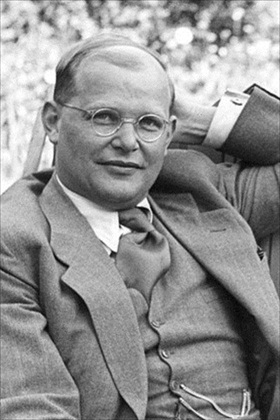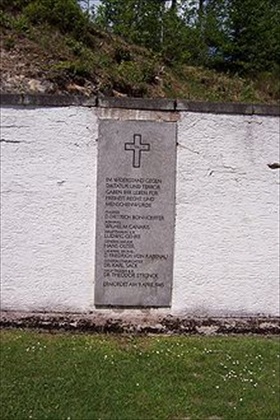NAZIS ARREST OUTSPOKEN GERMAN THEOLOGIAN
Berlin, Germany • April 5, 1943
On this date in 1943 in Berlin, Lutheran pastor Dietrich Bonhoeffer was arrested at his parents’ home by two agents of the Gestapo (Secret State Police). One of the leading Protestant theologians of the past century, Bonhoeffer was a founding pastor of the dissident Confessing Church (Bekennende Kirche), which rejected the Third Reich’s efforts to Nazify the German Evangelical (Lutheran) Church by forcing churches to embrace the aims and ideology of the Nazi Party. Best known for his widely influential 1937 (in Germany) exposition of the difference between “cheap grace” and “costly grace,” Bonhoeffer’s The Cost of Discipleship explored what it meant to live a genuinely Christian life in a dangerous and evil world (think Adolf Hitler’s Germany).
A gifted theologian, Bonhoeffer graduated summa cum laude from Berlin University with a degree in theology in 1927. By 1929, at age 24, he had earned his doctorate a full year before he was of legal age to become an ordained pastor. He enrolled in a postgraduate course at New York City’s Union Theological Seminary. During his year abroad Bonhoeffer developed his Christ-centered theology of social justice, determined to live out his faith in life and ministry back home. He was ordained in 1931.
Apart from his pastoral ministry, his fierce opposition to the Deutsche Christen movement (the faith wing of the Nazi Party), and his theological writings, Bonhoeffer was a fierce critic of the Nazis’ euthanasia program and the genocidal persecution of Jews and Jewish converts to Christianity. (His twin sister married a descendant of German Jews, a baptized Christian.) Not surprisingly, the Nazis forbade Bonhoeffer to speak in public in 1940 and the next year withdrew his ability to publish. Urged by his conscience to work against the Nazi regime, he joined the Abwehr (German Military Intelligence), an emerging center of anti-Hitler resistance, to avoid being conscripted into the Wehrmacht (regular armed forces). It was an act that shocked his Christian friends and colleagues. But his new occupation allowed him to travel widely and spy for the Allies under the protection of Abwehr chief and double-agent Adm. Wilhelm Canaris, who would share Bonhoeffer’s fate. Bonhoeffer therefore had crucial knowledge of, and roles in, several attempts on Hitler’s life, including the July 20, 1944, Valkyrie plot by the anti-Hitler coterie of Army Col. Claus von Stauffenberg, in which Canaris was involved.
Charged initially with relatively innocuous offenses when he was picked up in April 1943, Bonhoeffer spent 18 months in Berlin’s military prison in Tegel before being locked up in a detention cell at the Gestapo’s high-security prison on Prinz-Albrecht-Strasse. By then his connection with the 1944 “officers’ plot” to kill Hitler had come to light. In February 1945 he was secretly transferred to the Buchenwald concentration camp. He was summarily tried by an SS drumhead court-martial late on April 8, then hanged with Adm. Canaris and several other July 20th plotters at Bavaria’s Flossenbuerg concentration camp in the early morning hours of April 9, 1945, 2 weeks before that camp’s liberation by the Americans and 1 month before the war in Europe ended.
Dietrich Bonhoeffer (1906–1945), Lutheran Theologian, Pastor, German Resistance Martyr
 |  |
Left: Dietrich Bonhoeffer, late 1930s. Picture was taken some time after the Confessing Church (Bekennende Kirche) had split off from the German Evangelical Church (the Nazi-backed Reichskirche), which had become a state organ. The Confessing Church, in which Bonhoeffer and Pastor Martin Niemoeller (1892–1984) were leading voices, represented a major source of Christian opposition to the Nazi regime and its ecclesiastical policies and its anti-Semitic social legislation (Aryan paragraph), which excluded Jews and Christians of Jewish descent from participating in civil society.
![]()
Right: Flossenbuerg concentration camp, Arrestblock Courtyard: Memorial to members of the German resistance executed on April 9, 1945. Names on the granite block are Gen. Hans Oster, deputy head of the Abwehr under Wilhelm Canaris; Adm. Wilhelm Canaris; Dr. Dietrich Bonhoeffer; Dr. Karl Sack, German jurist slated for the role of Justice Minister in a planned post-coup civilian government; Dr. Theodor Struenck, who worked under Gen. Oster; and Gen. Friedrich von Rabenau, a member of the German resistance who was shot on specific orders of Reichsfuehrer-SS Heinrich Himmler on April 15, 1945.
Bonhoeffer Biographer Eric Metaxas on Bonhoeffer’s Role as Anti-Nazi Resister
![]()

 History buffs, there is good news! The Daily Chronicles of World War II is now available as an ebook for $4.99 on Amazon.com. Containing a year’s worth of dated entries from this website, the ebook brings the story of this tumultuous era to life in a compelling, authoritative, and succinct manner. Featuring inventive navigation aids, the ebook enables readers to instantly move forward or backward by month and date to different dated entries. Simple and elegant! Click
History buffs, there is good news! The Daily Chronicles of World War II is now available as an ebook for $4.99 on Amazon.com. Containing a year’s worth of dated entries from this website, the ebook brings the story of this tumultuous era to life in a compelling, authoritative, and succinct manner. Featuring inventive navigation aids, the ebook enables readers to instantly move forward or backward by month and date to different dated entries. Simple and elegant! Click 











